#Jesus heals the man born blind
Text
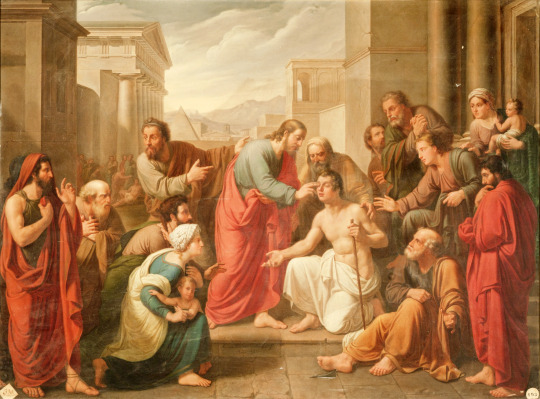
Agustín Gimeno y Bartual (Spanish, 1798-1853)
Jesus heals the man born blind, 1829
Real Academia de Bellas Artes de San Fernando
#Agustín Gimeno y Bartual#spanish art#spanish#spain#Jesus heals the man born blind#jesus heals the blind man#christian art#christian#christianity#neoclassical#catholic#bible#Jesus Christ#hispanic#latin#art#painting#artwork#fine art#european art#classical art#europe#european#oil painting#fine arts#europa#mediterranean#1800s
40 notes
·
View notes
Text
Why did Jesus put mud in that guy's eyes?
You may wonder why Jesus would heal this particular man using dirt and spit, when as God he can clearly do miracles without the aid of any substance, and all his other recorded miracles were done without this process.
However, if you know the Bible it is possible to work out what this symbolises. This was a man born blind. When Jesus uses dirt here, he is making a symbolic reference to the creation of man out of dirt in the Garden of Eden. Jesus here proclaims himself as Yahweh, the God who made man out of dirt, by creating for a man this new part of his body which he never before had - unlike other healing miracles in which that person was somehow sickened, this one clearly symbolizes not mere restoration but a totally new creation. Therefore taking the water from his own body and the earth out of which man was originally made, Jesus shows himself to be the Creator by creating in the way that only God can, to give a man the new ability to see which he never before had, which symbolizes the creation of the new man at the rebirth of the believer, which is a work of God.
478 notes
·
View notes
Text
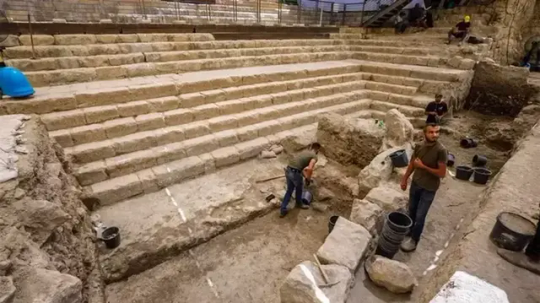
Biblical Steps Where Jesus 'Healed a Blind Man' Unearthed by Archaeologists
In Jerusalem, a recent excavation effort uncovered stairs that had been hidden for more than 2,000 years near the spot where the New Testament says Jesus treated a blind man.
A new excavation project in Jerusalem has unearthed steps unseen in over 2,000 years at a place where the New Testament records Jesus as having healed a blind man.
The Israel Antiquities Authority, the Israel National Parks Authority and the City of David Foundation early this year announced that the Pool of Siloam, a biblical site cherished by Christians and Jews, will be open to the public for the first time in 2,000 years in the near future.
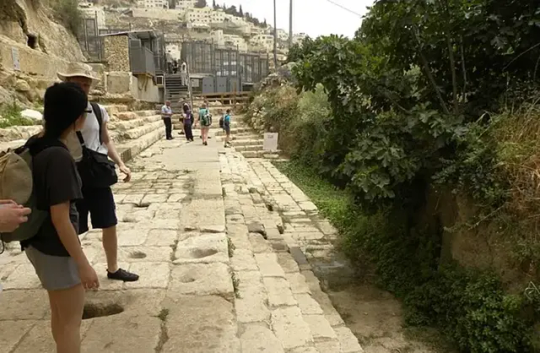
In recent weeks, archeologists achieved significant progress in the excavation, unearthing some eight steps descending into the Pool which had not been seen in 2,000 years — around the time when Jesus walked the Earth.
“The ongoing excavations within the City of David — the historic site of Biblical Jerusalem — particularly of the Pool of Siloam and the Pilgrimage Road, serve as one of the greatest affirmations of that heritage and the millennia-old bond Jews and Christians have with Jerusalem,” Ze’ev Orenstein, director of International Affairs – City of David Foundation said.
“Not simply as a matter of faith, but as a matter of fact,” he added.
The City of David Foundation is a non-profit organization established in 1986, “dedicated to the preservation and development of the City of David and its environs, and is committed to connecting people of all faiths and backgrounds to ancient Jerusalem.”

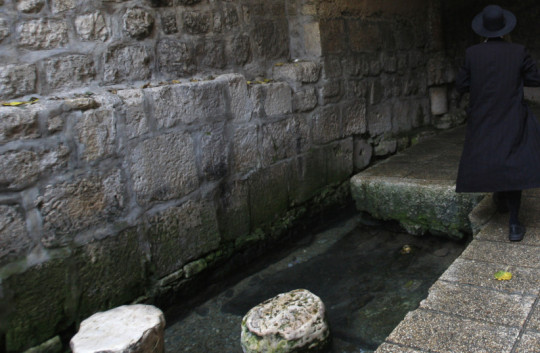

“The half-mile running through the City of David, from the Pool of Siloam in the south, continuing along the Pilgrimage Road, up to the footsteps of the Western Wall, Southern Steps and Temple Mount, represents the most significant half-mile on the planet,” Orenstein said.
“There is no half-mile anywhere on Earth which means more to more people – not to millions, but to billions — than the half-mile that is the City of David,” he added.
The pool was first built roughly 2,700 years ago as part of Jerusalem’s water system in the eighth century B.C.
The construction unfolded during the reign of King Hezekia as cited in the Bible in the Book of Kings II, 20:20, according to the two Israeli agencies and the City of David Foundation.
According to estimates, the Pool of Siloam passed through many stages of construction and reached the size of 1.25 acres.
According to a passage in the Gospel of John, Jesus restored the sight of a man born blind at the Pool of Siloam.
A small section of the pool, which has been fully excavated, has been accessible to the public for several years.
The vast majority of the pool is being excavated and will either be opened piecemeal or once the entire site is unearthed.

Rev. Johnnie Moore, president of the Congress of Christian Leaders, told Fox News Digital in January that, “In the Pool of Siloam, we find evidence of history preserved for us, revealed at just the right time.”
“Theologically, it affirms Scripture, geographically it affirms scripture, and politically it affirms Israel’s unquestionable and unrivaled link to Jerusalem. Some discoveries are theoretical. This one is an undeniable. It is proof of the story of the Bible and of its people, Israel,” he said.
A stroke of luck revealed the pool in 2004, when infrastructure work carried out by the Hagihon water company uncovered some of the pool’s steps.
The Israel Antiquities Authority, under supervision of professors Roni Reich and Eli Shukron, launched a survey.
As a result, the northern perimeter, as well as a small section of the eastern perimeter of the Pool of Siloam, were uncovered.
“Whether in the halls of the United Nations, ongoing efforts by Palestinian leadership, or on university campuses, Jerusalem’s Biblical heritage is under assault,” said Orenstein.
Orenstein noted that in few years time, visitors to the City of David will be able to witness the factual history for themselves and “see with their own eyes, touch with their own hands, and walk with their own feet upon the very stones their ancestors walked thousands of years ago, as they made their way to Jerusalem on pilgrimage.”
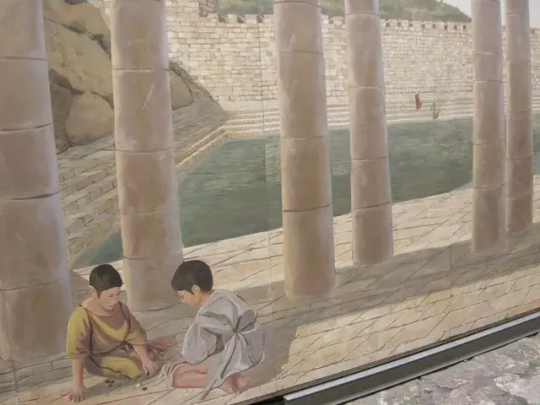
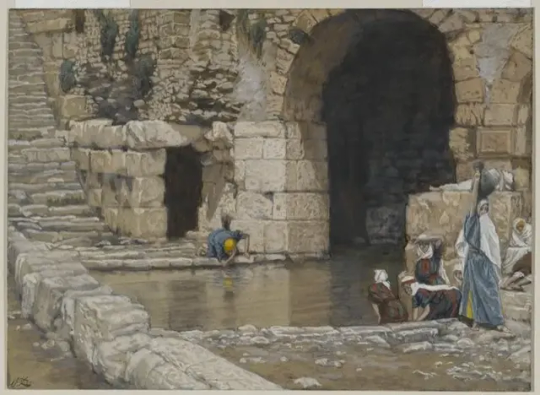

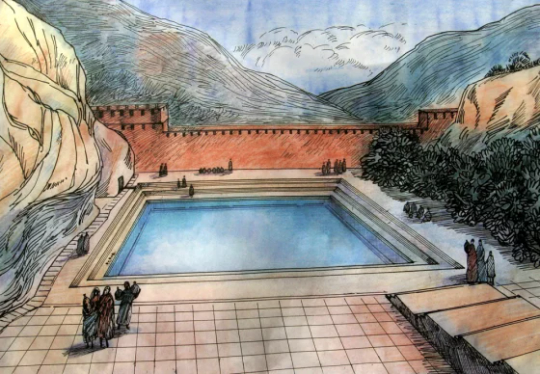
#Biblical Steps Where Jesus 'Healed a Blind Man' Unearthed by Archaeologists#Jerusalem#Israel#City of David#Pool of Siloam#Pilgrimage Road#King Hezekia#Jesus#Jesus Christ#ancient artifacts#archeology#archeolgst#history#history news#ancient history#ancient culture#ancient civilizations#ancient israel
130 notes
·
View notes
Text
my dearest fellow mdzs stans, i really don't want to spoil anyone's fun but sometimes some things must be said. please do NOT mistake fanon characteristics for canon characteristics because by GOD is it frustrating to dissect a character when all anyone wants to do is blindly turn away from the very vivid and metastasizing flaws.
jiang cheng is an extremely complicated character, and that's why we love him. but by god, he is a jealous, self-victimizing asshole with a massive inferiority complex who likes to torture (probably) innocent look-a-likes of his (as far as he knew) dead adjacent family member. jesus christ this isn't some simple case of miscommunication (well it is but, you know no amount of communication will ever mend the giant chasm that developed between them. especially not with asians raised within the most classical case of asian parenting, i mean come on now) but a matter of deep and intense self-loathing developed since early childhood projecting violently outwards. let me be clear. he hates wei wuxian. he loathes him. he wants to kill him with his own hands again and again so some part of his convoluted sense of justice and superiority will be fulfilled. he's a classist, a bully, and abusive to everyone around him. ong at the end of mdzs, i was nearly crying tears of joy when jin guangyao flayed him flat on his ass bc that man needed to hear it. he needed to feel it. he needed to stop blaming others and blame himself.
and!! he's homophobic!! the entire cultivation world is, yes, but he's the only one we see give wei ying and lan zhan active shit for it!!
point is...his complexity makes him interesting. as a child, he was pretty alright tbh. he was understandably upset when three of his dogs got taken away and he saw his dad give a completely random kid such a gentle hug when jiang cheng never received one so far. he was a kid, and it was sad and helped the readers get a glimpse at the already dysfunctional family dynamics before wei ying came into the picture. as an adolescent/teen, yes he had a lot of unresolved rage and inferiority issues building up when he was constantly being compared to wei wuxian by his mother and not given enough reassurance from his father (once again, all present before wei ying...everyone just likes to dump the shit on him bc it's easier to point fingers at others than at yourself). perhaps he could have turned out differently if literally either of his parents stepped up and took accountability. however, after the burning of lotus pier? after the golden core transfer? after wei ying stuck around as his subordinate just as he promised, and protected jiang cheng like he promised, and defected just to save the yunmeng clan's reputation so jiang cheng doesn't have to put up with the other clan's shit, still continuing to keep his promise? after wei ying's death? idk abt y'all, but all bets are off bro.
mxtx makes it a point to make him so irredeemable. he's an exploration of what can go wrong if you let your traumas, self-hatred, and revenge fantasies blind you. he has the worst traits of his parents for a reason, directly contrasting with the other sibling, who is a perfect picture of eldest daughters born into a dysfunctional family. jiang yanli has the best traits of her parents (in terms of compassion and standing up for her family), but the family dynamics also made her the way she was. the responsible, the mediator, the occasional mother, stepping in where madam yu cannot.
there's just so much potential to hold him accountable buried under the pretense of misunderstandings and kinnie moments. he just had so many chances, more than any other character, to make a different choice. to actually look past his misgivings and unlearn the bad habits he used to protect himself as a child. i'm not saying he has to magically heal from all his traumas, but at the very least know not to be like his parents. but he wasn't written that way. because that is what happens when you give into your insecurities and generational trauma.
bottom line: jiang cheng is a fantastic archetype that needs to be explored in all his authenticity, including his moments of loyalty and cruelty.
#jiang fengmian is literally yue qingyuan#embarassing af#as a mu qing apologist this was hard to write#but it needed to be said#jiang cheng choose an issue to cope with challenge#mission impossible#i'm not coming for anyone really i just needed to vent out everything bc he fr pissed me off in the novel haha#character study#jiang cheng#mdzs#mao dao zu shi#wei wuxian#wei ying#the untamed#the grandmaster of demonic cultivation#he just gives me a glutton for punishment vibes and i will not let him hide behind jc stans#the founder of diabolism#madam yu#jiang fengmian#jiang yanli#dysfunctional family relationships go brrr
335 notes
·
View notes
Text
Pieces of The Man Born to Be King that are lingering in my head lately:
After Jesus heals the man born blind, he goes back to talk to him, and the blind man rhapsodizes about how beautiful it is to see the moon for the first time and is like, "Can you imagine what it must be like to see it new like this?" And then Jesus quotes Genesis because he's remembering when He created the moon!
Pilate's hearing Jesus' case and doesn't care too much about this provincial religious dispute. Then the Jewish leaders tell him that Jesus has made himself a god, and Pilate goes back to Jesus and is like, "Where are you from?" with an almost desperate fear, because a god walking the earth is a much more real possibility to a pagan.
#catholic things#the man born to be king#dorothy l. sayers#i was going to do a longer list of cool moments but decided to keep it to these two#as the ones that are most vividly sticking in my head at the moment
167 notes
·
View notes
Note
could you tell us some more about lord hear my prayer? looove some religious imagery <3
GOD SAME it was born entirely out of a) john my beloved by sufjan stevens and b) the fact that there's not a lot of religious imagery in mclennon fics and i wanted to change this. it kind of stalled bc i wrote this big long scene in paris & then realized it didn't really... fit well w the theme of the fic? so i threw it into my "killed darlings" folder but lamented bc i lost like 3k of this fic & lost steam. but i 10000% wanna finish this one.
it's john's pov and basically centers around the idea of paul as a religion to john. inspired MAINLYYYY by the lyric "i've seen religion from jesus to paul" which is taken as like ya know being about beatlemania but when you have on yaoi goggles like me....
anyway, here's a snippet!
1953
The wooden pew was uncomfortable and unforgiving under John’s arse as the twelve year old shifted, squinting in the morning light at the painting hanging at the front of the room. In the soft, golden sunshine and aided by his piss-poor eyesight, the rough brushstrokes had faded out, giving the subject an ethereal sort of look that’d left him feeling like the wind’d been knocked out of him.
Course, John knew who Jesus was. Been dragged to enough sermons with Mimi and George to get the gist of it, but looking at the painting, John thought he might get it. A little. The figure in the painting was- well, beautiful, in a way he’d never seen a man painted to be. The man’s eyes were turned heavenward, eyelashes falling over supple cheeks, golden curls spilling around his shoulders. All brought together by strong, masculine hands clasped in front of him as he prayed, veins painted with a care that had John’s heart racing uncomfortably in his chest.
Truth be told, he’d never understood the whole Jesus thing. Now, he wasn’t an atheist or summat- only the truly worst sorts of people were, at least that’s what his auntie said. But it was all just a little hard to believe, wasn’t it? Sounded more like the books he liked to read than something that actually happened. If God was out there healing the sick and the blind, then why was John’s vision still shite? Didn’t make a lick of sense, not to him. But staring at the painting, he thought- well, if that’s what he’d looked like, he probably would’ve followed him too.
Not in any queer way, mind, just the same sort of way he gotten a right thrill out of Carl, one of the year nines, inviting him with the rest of the lads for a smoke. Leaned against the brick of the school wall, choking on smoke and feeling his head spin from the rush, he’d looked up and seen the smoke from all the boys’ ciggies clouding around Carl’s face and thought it looked right out of a film. It was the same sort of feeling he felt now, twisting up in his chest and tugging.
Was that what people were talkin’ about, then? When the little old ladies would coo about the spirit of the lord? Maybe that was it- the painful, swooping feeling stuck under John’s ribs as he blinked up at the painting, remembering Carl’s toothy grin as he’d laughed and laughed and laughed at John’s coughing. His pink tongue poking out between those teeth, head tipped back to reveal a long neck and protruding Adam’s apple.
John’s cheeks had started to heat and he shifted to lean back against the unforgiving pew, crossing his arms over his chest, feeling embarrassed for reasons he couldn’t even begin to place. Next to him, Mimi shot him a look, reaching over to pinch his shoulder until he sat up again. He sighed, uncrossing his arms with a scowl, eyes flicking away from the painting. Up by the pulpit, the priest’s strong voice washed over the crowd, Bible clutched in one outstretched hand.
“We must remember, from Corinthians, what the Lord has said of all earthly temptations,” the priest began. He cleared his throat, sweeping his eyes over the congregation, imploring them to listen. John already knew he wouldn’t understand- those old words were too jumbled up and confusing. “‘There hath no temptation taken you but such as is common to man: but God is faithful, who will not suffer you to be tempted above that ye are able; but will with the temptation also make a way to escape, that ye may be able to bear it.’”
At the front of the church hall, the priest looked tired. His hair was thinning and he’d swept it forward in some attempt to pretend it wasn’t. What was probably a handsome face when he was John’s age had turned sour, like fruit that’d been sitting out on the kitchen table too long. His nose was a deep red, speaking to just what sorts of temptations
Nah, he decided, fixing his gaze on the blue polka-dot fabric of the woman’s dress sitting in front of him, he didn’t get it all.
#this scene specifically was based on memories i have as a kid of being enraptured by this one painting of jesus at church#not in a gay way mostly in an art way bc the artistry of it was really neat but i was like well john's gay it'd be in a gay way for him
9 notes
·
View notes
Note
Is it just me, or have The Chosen writers felt an increasing amount of liberty when it comes to making changes that are not true to the gospels? The man born blind doesn’t walk to the pool in the show. I don’t think Gaius counts as a centurion when he goes to Jesus. The religious leaders don’t talk to Jesus about Gaius, and their lines are given to Peter. Jesus doesn’t start to make his way to the house of the centurion only to be stopped by the centurion’s friends.
Hello! Thank you for your message.
I heven't watched whole season 4 yet, but I'll try to answer to this with what I already saw.
I get your point but I don't think writers are far from The Gospels and I wouldn't call it that what series showing is not true. I mean, the man born blind doesn't go to the pond, true, but he had water that he used to wash himself. I think the most important things are included: the true mesage of The Gospels about Jesus and his teaching.
What I'm trying to say is that I personally don't mind small changes if the whole story stays true to itself. I think we should think of it as a inventions of writers? I'm sure they have reasons to write some scenes just the way we see them now. The whole Gospels are also huge so probably we don't get to see everything, sadly.
The pond was not mentioned but the whole idea of this story was captured: healing the blind man and pointing pharisee's hypocrisy out.
Some stories about healing and sermons in the series are not written chronologically (they don't take place in Biblical order) and sometimes they are mixed together. What I understand is that we have Four Gospels written by four different men, so even when they write about the same things and stories that happened sometimes they don't have identical details. And that doesn't mean some of The Gospels are truer that others.
As for Gaius, for me he counts as centurion. It's the same what I wrote earlier: scenes are written by someone and we see what this person wanted to show us. This was writer's idea of the story and if it stays true to the whole message of The Gospels (and also true to the historic context etc.) I don't find it disturbing.
We also get a lot of side stories for disciples that are not in The Gospels, but I don't think it is wrong when the show wants us to see that all these people following Jesus were just exactly... people and they were like us. I think it's beautiful, because it shows us that even the people that were closest to Jesus, that were his friends weren't always the bestest, the wisest, the humblest etc. etc. etc. but they certainly were most loved by Jesus just the way they were.
Ok, sorry for the long response. :D And please, remember this is my opinion and you don't have to agree with me. I completely understand if you don't.
Anyway, take care and stay blessed!! +
10 notes
·
View notes
Text
SEASON 4 EPISODE 3 SPOILER REVIEW
The big one. Oh my goodness.
So obviously if you didn’t see it in theatres, and won’t be seeing it until it comes to streaming, then please please avoid reading this. I have tagged these reviews so hopefully no one who didn’t want to see this didn’t. So without further ado—
The episode opens up on King David begging God to spare his and Bathsheba’s son. After the child dies, the two of them are preparing for a dinner. Bathsheba is of course devastated and asks why God answers some prayers and not others, to which David says he doesn’t know. But he believes they will see their son again in death and they must trust the sovereignty of God.
This is where you’ll have to forgive me, a lot of it is fuzzy, but I will describe as best I can.
Quintus basically tells Gaius that he has to get things under control or he’ll be demoted. Gaius has obviously at this point shifted loyalties. He comes across Matthew and Gaius warns him to warn Jesus that he needs to lay low or things could escalate quickly.
Shmuel is being promoted to the Sanhedrin, but has doubts after talking and praying with Jesus. During the meeting an edict is given that Jesus is a wanted man for blasphemy and any knowledge of where he is should be turned over immediately. They want to expose and question him. An argument breaks out but Caiaphas steps in and says that Jesus is a threat and they must be willing to work with Rome for now to neutralize him. Shmuel says that he must find Jesus, presumably to warn him?
Yousef, we find out, is an honorary member of the Sanhedrin through his father and he decides he must travel to Jerusalem to see how he can stop them from finding and potentially harming Jesus and his disciples.
Thomas and Ramah have this beautiful scene where Thomas gives her a wedding gift which James and John helped him buy. It’s a sun dial, he says he’s always wanted to get it for her because time seemed to stop when he was with her. They say they have eternity together. It’s honestly such a romantic moment that made my heart flutter.
We get to see Peter and Matthew bonding!!! So sweet.
John and James talk to their parents and their mom Salome finds out about Peter’s new name and asks what her son’s new names and positions were. When she finds out they didn’t get any, she convinces them that they need to step up and ask for them because they’ve been with Jesus just as long as Peter has, they deserve it. Zebedee tries to talk them out of it but Salome says if they won’t do it then she will. They agree to say something after she convinces them.
Jesus and co head on out and meet up with Shula and Barnaby. Shula tells Jesus about her friend (Hezekiah?) who was born blind and is sitting outside the synagogue. Someone in the crowd asks who sinned that he was born blind and Jesus says it wasn’t because of sin, but that God’s work could be shown through him. He goes to him and tells Big James to get a bucket of water, while he mixes spit and mud and puts it over the man’s eyes, then tells him to wash it away with the water. When he does, he can see. There’s a celebratory moment as the man who asked Jesus the question gets a crowd to form and the Pharisees take note of this.
They bring in the man for questioning and when he says he thanks Jesus for healing him, Rabbi Akiva says to only praise God because Jesus is a sinner. To which the former blind man replies, “Whether he is a sinner, I don’t know…but what I do know is where I once was blind, now I see.” (The theatre audience clapped, including me) we see Jairus also be like ✊. The man and his parents are kicked out of the synagogue.
Akiva and another Pharisee go back outside to see Jesus preaching and accuse him of blasphemy and sinning. Jesus goes OFF on them and they argue back at him but he reads them for filth and when they’re like, “Take it back.” He goes, “I am just getting started.” And everyone in the theatre started hooting and hollering (including me because it was such a good moment) and that’s when the crowd starts getting riled up.
Surprise! Atticus is there and sees things heating up and turning into an almost riot. Surprise surprise! Gaius is also there and he tells Gaius to give Quintus the message that his career rides on what he does with this crowd. Gaius sends someone else to deliver the message and Quintus kinda snaps and heads into the crowd himself.
During the fray, people get trampled, things start heating up and the group gets kinda separated. Everyone starts crowding in on Jesus and Peter, Matthew, Zee, etc. start trying to help him escape. Quintus tells Gaius to arrest Jesus and Gaius REFUSES EVEN AFTER BEING THREATENED WITH ARREST. He is then taken into custody.
As things get worse, Thomas realizes that while everyone else was able to get out ok, Ramah is missing. He goes back and finds her and starts leading her away. Meanwhile, Quintus has been trampled, defied, and is losing his grip. He tries to regain some control by pulling out his sword and threatening everyone to stand back. Thomas, trying to get Ramah out of there, pushes past him.
In the heat of his rage, Quintus STABS RAMAH and Atticus pulls him away after he realizes what he’s done.
Jesus hears screaming which he recognizes and runs back to find the scene. Thomas begs him to heal her and Jesus says something interesting, “I love you, the Father loves you. It’s not her time, I’m sorry.”
Ramah dies in Thomas’ arms as he weeps.
OH BOY DO I HAVE THOUGHTS AND IDEAS AND THEORIES:
First, there is a livestream Dallas did about the subject and there’s such good discussion in there about it so I highly recommend it. There’s a spoiler free beginning and then full spoiler second half.
Second, JESUS’ WORDS ARE VERY INTERESTING HERE. “It’s not her time.” And even Dallas mentions this in the livestream. So I have a theory. In the Bible, it says that Jesus’ resurrection brought about resurrection of other various saints. Soooooo I’m thinking Ramah will be one of them which if I’m right I will scream in the theatre. Because those words, “It’s not her time,” were too specific to just be like—oh it’ll happen in heaven. I mean maybe that’s what he meant but 👀
If you too were affected by these first three episodes please feel free to come scream with me in my DMs. I’m seeing 4-6 this weekend May God have mercy on my soul.
9 notes
·
View notes
Text

John 9:1-7 (ESV). “As he passed by, he saw a man blind from birth. And his disciples asked him, “Rabbi, who sinned, this man or his parents, that he was born blind?” Jesus answered, “It was not that this man sinned, or his parents, but that the works of God might be displayed in him. We must work the works of him who sent me while it is day; night is coming, when no one can work. As long as I am in the world, I am the light of the world.” Having said these things, he spit on the ground and made mud with the saliva. Then he anointed the man’s eyes with the mud and said to him, “Go, wash in the pool of Siloam” (which means Sent). So he went and washed and came back seeing.”
“Jesus Is Interruptible” by In Touch Ministries:
“Choose to see interruptions as opportunities to love like Jesus.”
“In our passage today, the Lord was on His way somewhere but stopped to heal a blind man. He could easily have passed by—Jesus was a busy man, after all. But He allowed Himself to be interrupted, and one person’s life was forever changed.
“I am the Light of the world,” Jesus said before applying mud to the man’s sightless eyes (v. 5). The thought of putting mud in a blind man’s eyes to clear his vision might seem strange to us today. However, Jewish onlookers may have recognized this as a medical practice of the day. It’s even possible they interpreted it as a new act of creation, since mud could have reminded them of God forming Adam from the dust of the earth. If such scriptural imagery was, in fact, Jesus’ intention, it would convey that He truly was the Word who was with God in the beginning—one with God Himself.
Whatever the reason for this unusual-sounding treatment, we know that dirt and saliva became holy instruments in Jesus’ healing hands. So let’s consider what God might be doing in our midst and pray for His direction as we seek to love others through our time and attention. It’s exciting to realize that if we’re willing to alter our plans, we may become vessels of His healing work.”
(Photo by Jack Sharp at Unsplash)
#john 9:1-7#god loves you#bible verses#bible truths#bible scriptures#bible quotes#bible study#studying the bible#the word of god#christian devotionals#daily devotions#bible#christian blog#god#belief in god#faith in god#jesus#belief in jesus#faith in jesus#christian prayer#christian life#christian living#christian faith#christian inspiration#christian encouragement#christian motivation#christianity#christian quotes#in touch ministries#keep the faith
9 notes
·
View notes
Text
Jesus Heals A Blind Man.
John 9:1-34 CSB[1] As he was passing by, he saw a man blind from birth. [2] His disciples asked him: “Rabbi, who sinned, this man or his parents, that he was born blind?” [3] “Neither this man nor his parents sinned,” Jesus answered. “This came about so that God’s works might be displayed in him. [4] We must do the works of him who sent me while it is day. Night is coming when no one can work.…

View On WordPress
3 notes
·
View notes
Text

EXERCISING FAITH IN PRAYING FOR YOUR LOVED ONES
"Before she travailed, she brought forth; before her pain came, she was delivered of a man child. Who hath heard such a thing? who hath seen such things? Shall the earth be made to bring forth in one day? or shall a nation be born at once? for as soon as Zion travailed, she brought forth her children. Shall I bring to the birth, and not cause to bring forth? saith the LORD: shall I cause to bring forth, and shut the womb?" saith thy God. Isaiah 66:7-9
Travailing for Souls
Soul travail is an impassioned, deep level of intercession (prayer) that affects the spiritual atmosphere so that the lost can hear the Gospel and make a decision to receive Jesus Christ as their Lord and Savior. We literally push back the blinding, oppressing power of the enemy so that the Gospel penetrates the heart. Effective evangelism can never be done without a burden, anguish, and true weeping for souls in prayer first! (Photo via Freeimages)
We need to be wrestlers with God for souls. We need to become like Jacob (see Genesis 32:24-30) and say, "I'm going to get a hold of You, Lord God. I am going to wrestle with You, O God. I am going to labor right here in the spirit until You bless me. I want You to bless me with souls: the lost and dying world getting saved, healed, and delivered. I am going to wrestle with You, O God, until my household gets saved."
The apostle Paul talks about travail: "My little children, for whom I labor in birth again until Christ is formed in you" (Galatians 4:19). Paul had already labored and travailed for their spiritual birth and once again he is in labor until Christ is formed in them.
There is a fire, there is an anointing, that can fall on us so that we are literally overcome with the heart of God. There is grace available from the Lord to bow before Him on our face, weeping, crying out, and there is grace for us to be touched by the Holy Spirit to labor and travail for souls.
And God can take us out of our comfort zone and compel us by His Spirit to go into the streets to share the Gospel with the lost. We'll be moved into evangelism.
We Have a Great Promise of Household Salvation and Revival!
And they said, "Believe on the Lord Jesus Christ, and thou shalt be saved, and thy house." Acts 16:31
There is a place where we stop asking God to give us what He told us to take. There is a place where we recognize that we have an enemy to the harvest God wants to give us.
We need to rise up in the spirit and say, "Joe, or Sue, I set you free in Jesus' name. Come forth, you who sit in darkness. I command you, devil, binding Joe, to loose him to see. I lay hold of Joe in the spirit and I open his eyes to see. Lazarus come forth!" When we begin to take authority and become pregnant with God's heart for souls, and travail through weeping and warfare prayer, we can see a great harvest.
Key: What You See is What You Get!
The song "Open The Eyes of My Heart" is actually a reality for the believers that see the harvest with the eyes of their heart and now they get a revival. Are you provoked to jealousy? Are the eyes of your heart opened? Do you see the harvest?
Key: Birthing
We need to be burdened with his heart in our spirit for souls and pray until we see a breakthrough. That is true travail and birthing God's purposes in the earth. We need to sense God's plan in our spirit, too, and then move into that place of relentless intercession and prayer until we see a manifestation of His promise.
Key: Identify With the Lost
Jesus gave up His glory in Heaven and became God in the flesh and took on a human body. What a drastic change! He gave up the glory and power in the heavenly realm and came down to earth as the Son of God, with no reputation. When He took on human flesh just like ours, He was tempted as we are tempted, yet without sin (see Hebrews 4:15). He knew then, and He knows now, what we're going through. He identified with our human condition and He saw first-hand how needy and lost we are. In fact, because of His personal identification, He could become our High Priest and Intercessor (see Hebrews 4:13-16, 5:1-10).
You know, we need to be able to identify with the lost, too. Perhaps we need to remember what our lives were like before, when we were blind and walking in darkness. Because afterwards we'll have more passion and feel the urgency to see that lost souls find Jesus Christ. God wants us to be moved with a burning heart for the lost to be saved!
When we allow the Holy Spirit to take us into a place of identification, we will actually identify with the plight of the lost to the point that our heart and emotions become involved. At this point we need to persevere and allow ourselves to move into prayer in a deeper and deeper way, travailing for the salvation of souls.
The Key to Growing and Sustaining Revival
There is no growing in or sustaining revival without travailing prayer. As persecution mounted against the early Church, some of the apostles were beaten and jailed but later escaped when the angel of the Lord opened the gates of their prison during the night in Acts 5:17-20. It was a time of miracles and conversions! The Church was growing, and in the middle of all the excitement, there arose a legitimate complaint (see Acts 6:1).
The apostles decided not to involve themselves in the problem, but they suggested a remedy (see Acts 6:2-3). Here's the reason why they didn't want to become involved: "but we will give ourselves continually to prayer and to the ministry of the Word" (Acts 6:4). The apostles knew they had to be in that place of prayer, birthing souls into the Kingdom of God.
Their wise choice to devote themselves to prayer and the ministry of the Word helped the Word of God to spread to the point that the number of the disciples multiplied greatly in Jerusalem, and even many of the priests were obedient to the faith. The number of disciples went from "multiplying" to "multiplied greatly" (Acts 6:1, 7).
They realized that the key to the continuation of the harvest and the fuel to the revival with mighty signs and wonders was the Word of God and prayer. Prayer was first and foremost! They placed such importance on that and we need to come back to that place of prayer for the lost, too.
ALBERT FINCH MINISTRY
6 notes
·
View notes
Text
July 8
Psalm 103:13 As a father has compassion for his children, so the LORD has compassion for those who fear Him.
Psalm 37:7 Rest in the Lord, and wait patiently for Him; Do not fret because of him who prospers in his way, because of the man who brings wicked schemes to pass.
Psalm 46:10 Be still, and know that I am God: I will be exalted among the heathen, I will be exalted in the earth.
Matthew 11:28-30 Come to Me, all you who labor and are heavy laden, and I will give you rest. 29 Take My yoke upon you and learn from Me, for I am gentle and lowly in heart, and you will find rest for your souls. 30 For My yoke is easy and My burden is light.
Jeremiah 6:19 Hear, O earth: behold, I am bringing disaster on this people, even the fruit of their thoughts…
1 Peter 2:1 Therefore, rid yourselves of all malice and all deceit, hypocrisy, envy, and slander of every kind.
May you cry out to God when you are engaged in battle against the spiritual forces which defy God and His will for His people, for He will answer your prayers and deliver His enemies into your hand because of your trust in Him. 1 Chronicles 5
May you not trust in fame, strength, or authority to receive God's blessings, but walk with Him in humility, faith, and love. 1 Chronicles 5
May God give you a revelation of Jesus Christ that brings light and life, understanding and wisdom, grace and mercy flowing from you to others. Acts 26
May the Lord not rebuke you in anger or discipline you in wrath, but deal with you in mercy and heal you in compassion. Psalm 6
My kingdom awaits you, My child. Are you willing to enter in and join in fellowship with Me, in agreement with, and submission to, the living Word of God? The ruler of this world has no part of, and nothing in, Me or My kingdom, having created his own kingdom in the world of man.
The way of this world's kingdom is easy, and the gate leading to it is wide to accommodate all the various religious approaches. Anything will do; if you don't like what you see, make up your own. If it feels good, do it, and you'll find others who will join you. There are no restrictions, and no membership fees, until much later.
The way to My kingdom is hard, requiring your submission and humble obedience, and the gate is narrow for My Father has designated Me, His only-begotten Son, the first-born among many brethren, to be the only Door. Yet I accept all who receive Me in faith, believing that I am sent by the Father, no matter what path you have come from.
To follow My way in your own strength is impossible, no matter what you have accomplished by your own resources and skills in the world; yet even the weak, lame, and blind can walk in My way, for I send My Spirit to watch over each one who follows My Word as I confirm it in your heart, witnessing to your spirit that this is the Way.
As you start along the way that leads to life, you will find that the clean water of My salvation, the fresh wind of My Spirit, the broken bread of My Truth, will cause you to grow stronger through the walking out of your faith and the exercise of your gifts.
But it also means that all your interest and concern for the things of this world will narrow, while the straitened path you follow along the Way of Truth will permit all of your focus on and desire for God to broaden. This will allow you to disentangle yourself from the cares and worries of this world, and bring every power of body, soul and spirit into focus on nothing less than My will and purpose for you.
This is the kingdom path which leads to sanctification and purity, by which you are prepared for eternal life in Christ. The inward work of the Spirit and the Word in your heart and mind, your spirit and soul, your thoughts and intents, your words and deeds, brings you into alignment with the Father's will and purpose, that you may be one with Me even as I am one with the Father.
Come away with Me, My beloved, away from the noise and rush of the crowd, and hear My still, small voice speaking to you, leading you in the path you are to follow.
May God turn to you in deliverance and save you in His unfailing love that you may praise Him in remembrance of His goodness and lovingkindness. Psalm 6
May you find strength in the Lord when you are exhausted with sorrow, and joy in the Spirit after a night of weeping, for when you are weak, He is made strong and brings the victory over your foes. Psalm 6
May you cry to the Lord for mercy, for He has heard your weeping and accepts your prayer, therefore all your enemies will be ashamed and dismayed, and those who do evil will be turned back in sudden disgrace. Psalm 6
May the fruit of your mouth be sweet and the harvest of your lips be satisfying, for your belly will be filled by your speech, and your heart will be fed by your words. Proverbs 18:20
May your speech be prudent and given to God, for the tongue has the power of life and death, and from the abundance of the heart, its fruit will be known. Proverbs 18:21
2 notes
·
View notes
Note
There are lots of questionable decisions The Chosen writers make, and the one you’re concerned about is regarding Thomas? The man born blind doesn’t walk to the pool in the show, and in the show the healing doesn’t take place in Jerusalem. The religious leaders don’t talk to Jesus about Gaius, and their lines are given to Peter. Jesus doesn’t start to make his way to the house of the centurion only to be stopped by the centurion’s friends. Jesus doesn’t gather his many disciples together and choose 12 of them when he comes down from the mountain.
You can send me the same things over and over and my answer is going to be the same.
And, yes, I am more concerned about the situation with Thomas because when the focus is directed to him, it undermines the actual point of that event. Changing a location or using one account over the other doesn't change where the focus is. (Again: there are two accounts of the centurion, and one doesn't include the details about his friends. I'm telling you this time because clearly you didn't go look it up yourself.) Moving the focus to Thomas' grief distracts from what Jesus was teaching here, namely that He is the Resurrection and the Life. That is the point here.
So sorry I'm more concerned with theological points being missed than I am the location of an event. /s
#the chosen#the chosen tv series#the chosen season 4#the chosen spoilers#not really sure there are spoilers here but just i case#i still have no idea what the jesus gaius peter one is about#feels like you added one sentence at the end and one at the beginning and copy n pasted the rest from the last ask you sent#asks
3 notes
·
View notes
Text
Why be born again? Part 2

Nicodemus comes to see Jesus: John 3:1-4
John 3:1 There was a man of the Pharisees named Nicodemus, a ruler of the Jews.
Nicodemus was a Pharisee- which means he was a deeply religious man, who scheduled prayer 7 times each day, he also visited the temple 3 times a day, and would include discussions on theology and perform charitable deeds on a regular basis.
Nicodemus was in the ruler of the Jews, a ruler of the people, in other words, a top man and a VIP. Some historians think that Nicodemus might have been part of the Ben Gurion family who were a wealthy and powerful family in Israel in those days.
Nicodemus as a Pharisee would have known the Law and the Prophets' scriptures and would certainly have learned them by heart.
2 This man came to Jesus by night and said to Him, “Rabbi, we know that You are a teacher come from God; for no one can do these signs that You do unless God is with him.”
3 Jesus answered and said to him, “Most assuredly, I say to you, unless one is born again, he cannot see the kingdom of God.”
v2 Might have been to avoid public scrutiny or might have been both men were busy during the day. Nicodemus calls Jesus rabbi meaning ‘professor’ or ‘teacher’ indicating that he was impressed with Jesus’ learning at a soulish level. However, intelligence is soulish, and Nicodemus did not call Jesus Lord.
When Nicodemus called Jesus Rabbi (a teacher from God) he had got it right thus far, for the many miracles Jesus did were a proof that he was messiah.
The miracles of Jesus included those prophesied in the old testament for example from Isaiah 29:18-19 (deaf, blind healed etc.), and in Isaiah 35: 4- 6 (deaf ears opened, mute healed, and the lame leaping etc.). These miracles were prophesied some 700 years BC. Another miracle Jesus performed was to heal people with leprosy. Nicodemus would be aware that although the priests routinely diagnosed leprosy as in Leviticus 13, no one until Jesus had actually cured leprosy (see Leviticus 14). Modern medicine has only found a cure for leprosy in the last twenty years.
When John the Baptist-heard of the works of Christ-he sent messengers to ask Jesus are you the expected Messiah…? Jesus answered in a spiritual manner-quoting the miracles! Nicodemus wants to talk theology, but Jesus wants to talk spiritually to him (remember Nicodemus has only a dead spirit).
v3 Jesus tells him, Amen, Amen, your spirit needs to be born again (regenerated or made alive) or you cannot see the Kingdom of God. Nicodemus’ dead spirit needed to be regenerated i.e. brought to life.
4 Nicodemus said to Him, “How can a man be born when he is old? Can he enter a second time into his mother’s womb and be born?”
v4 Nicodemus responds from his soul asking if Jesus meant a physical rebirth showing that Jesus’ words sounded crazy to him -he did not understand what Jesus was telling him.
In Part 3 we continue to explore the fascinating dialogue between Jesus and Nicodemus in
#christianity#bible study#bibletruth#blog post#blessings#psalmonesermons#faith#victory#devotional#nicodemus#born again
3 notes
·
View notes
Text

@jollysunflora
Hell yeah! Muse of life time!
•So I've never really put too much thought into the master classes. They just never really interested me, plus we only have one example each, so my autism brain would just always feel like there's not enough info when trying to analyze them. Honestly, that made it kinda fun to look into this class!
•So Muses are essentially just the ultimate passive class. I don't even use the active-passive theory in my analyses, but Lords and Muses are just that with the ladder being the passive one. I see Muses as just having an area of effect for their aspect in both the metaphorical sense and the semi-literal. The best way I can put my thinking into words that make sense is Lords completely use their aspect and Muses give others their aspect as well as influence the aspect around them.
•Life is the aspect of healing, positivity, rebellion, nature, wealth, energy, and optimism. It's plainly one of the most straightforward aspects. It represents the hand you've been dealt in life and what you do with it, and nature.
•A Muse of life is the ultimate healer. They represent all parts of Life and utilize it for the benefit of others and the aspect itself. when your aspect is literally healing and nature and your class is Influencing and working with said aspect, no contest, a pure hype man.
•I'm gonna be honest when I first read the reply I was caught off guard by classpecting Jesus lol. The Bible and Homestuck aren't really two things you see cris crossed, But after thinking about it, Yeah Jesus is a Muse of Life. Like, Even not acknowledging the miracles he performed (Healing the blind, multiplying fish a bread, healing a man with a withered hand), the overall story of his birth, life, death, and resurrection all align perfectly with a Muse of Life. I don't completely trust myself to summarize 4 books of the bible while connecting it to Homestuck, but the main parts are easier, He was the literal son of the creator of life, was born a virgin birth, healed those around him, loved thy neighbor, died, came back, left, and promised to come back. My guy, that's the most muse of life story out there.
10 notes
·
View notes
Text
“God Planning Your Pain to Make a Point” (John 9:1-3) [A Guest Card Talk]
“God Planning Your Pain to Make a Point” (John 9:1-3)
A Guest Card Talk by Matthew E. Henry*
It’s What You See
As [Jesus] walked along, he saw a man blind from birth. His disciples asked him, “Rabbi, who sinned, this man or his parents, that he was born blind?” Jesus answered, “Neither this man nor his parents sinned; he was born blind so that God’s works might be revealed in him. … When he had said this, he spat on the ground and made mud with the saliva and spread the mud on the man’s eyes, saying to him, “Go, wash in the pool of Siloam”…Then he went and washed and came back able to see. (From The Gospel According to John 9:1-7, NRSV)
As a poet and educator, a quote from Henry David Thoreau is often on my mind: it’s not what you look at that matters, but what you see. There’s a lot in John chapter 9 to be seen, and it would be easy to focus on all of the blindness, the lack of sight in this story:
The man at the center of the story is literally blind. (vs 1)
The disciples’ lack of understanding and metaphoric blindness before the healing takes place. (vs 2-7)
How, after sight is granted to the formerly blind man, the Pharisees and the crowd display a lack of belief (spiritual blindness) by questioning if the man was even really blind to begin with, and then driving his whole family out of their religious community for their dealings with Jesus. (vs 8-41)
All of these elements are fair game, clearly build upon each other, and are a part of the central point of the passage. It’s also what I was taught as a kid in Sunday School. But this was never the first thing I saw. I was always deeply bothered by this flannel graph favorite, but it took me years to understand what was staring me right in the face: the blindness of Jesus.
maybe Jesus needed more time to think
the disciples asked Him whose sin blinded
this man from birth: his, his parents? appalled,
Martha cannot believe in this Jesus
whose deaf answer trembles her Bible closed.
so that you could see the power of God?
she remembers the eyes which accused her
of lapses in prenatal care. questioned
her fidelity. found lawful cause for
his tiny body’s chronic rebellion
against its own good. as the pastor reads
His response, she finds their false blame better—
more acceptable—than sons suffering
for parlor tricks, divine object lessons.
~ MEH
What Do We Deserve?
From the outset, this story is a theological and emotional rollercoaster. Jesus sees a man who is blind, and since this is Jesus, we assume a healing is forthcoming. But before He can open His mouth, His disciples ask a provocative question:
“Rabbi, who sinned, this man or his parents, that he was born blind?” (vs2)
The disciples see someone in pain and ask a question accusing the man and his family of being so sinful that he deserves his aliment. The implication is plain: natural pain, illness, or sickness is the result of sin. We get what we deserve, which may include bearing the burden of our parents’ sin.
Look, I’m a high school teacher. I have no problem with basic “cause and effect” logic when it comes to consequences. You didn’t do your homework or study, so you failed the test. You tipped back in your chair, so you fell over. You said something racist/sexist/homophobic to the wrong person on the right day, so now you walk with a limp. Speeding can cause an accident. Unprotected sex can result in an STD. Uncritical voting practices can, ironically, lead to the downfall of democracy. These are outcomes easy to understand. But most of us will balk at the idea that we “deserve” an effect that is not a direct result of something we ourselves caused.
To some degree we can begrudgingly accept the reality that the decisions that others make, especially our parents, can have a negative impact on us. Ask the family, significant other, coworker, or employee of abusers, alcoholics, emotional manipulators, gamblers, or any other shitty people. We can all be hurt by the actions of others, but to say we “deserve” that hurt is unhealthy. [Pause: if you don’t think this is true, you are probably in an abusive situation, as your friends have been telling you for years. Listen to them. Get out.]
The beginnings of Jesus’ responses bears out the truth of this:
Jesus answered, “Neither this man nor his parents sinned… (vs 3a)
YES, Jesus! Smack down their highly problematic theological assertion—their backward hamartiology imputing sin on the innocent. This is where the story should: Jesus drops this knowledge, heals the man who is blind, and they all go out to throw loan sharks out of the Temple. But the problem is that Jesus keeps (f**king) talking…
“…he was born blind so that God’s works might be revealed in him.” (vs 3b)
Seriously Jesus: WTF?
Let’s really stop and unpack this.
In answering thier question, Jesus says that this man’s decades of blindness was preordained by God—presumably before the foundations of the earth were lain—as a “parlor trick” or “divine object lesson” for the benefit of the disciples (and presumably everyone else who would come in contact with the healed man, whether in person, or reading his story in the Christian New Testament). Yes. The number of people impacted by this miraculous event is an amazing witness. And no doubt the formerly blind man was very grateful for his healing (you know, save for the whole having his life of pain questioned and his family run out of town thing, which undoubtedly sucked). But, again, let’s really look at what this means.
Let’s propose a new scenario: a mother has a child with a serious physical or cognitive limitation which significantly harms the child’s quality of life. She hears this story being preached by her pastor/priest from the pulpit one Sunday morning. What would she take away from this tale?
It’s one thing to believe an almighty God is doing the Divine’s Best to redeem all our free will actions—that “all things working together for good” (Romans 8:28) means that God is exerting effort in the face of the causes and effects that lead to our pain. Call it “natural evil,” or “a result of The Fall,” or “nature red in tooth an claw,” or “shit happens,” this mother, like many of us, can begrudgingly accept this idea when it comes to “why bad things happen.”
But it is another thing entirely to ask this woman if she is comfortable serving a God who believes that the ends justify the means. Asking her to accept a utilitarian model of theodicy—achieving “the most good for the most people” means that some people have to suffer by divine design. What could she take away other than false hope or anger at the prospect that maybe, hopefully, there is “some good reason” that God has for directly causing her child pain?
That might be a shit-filled pill too large to swallow.
It Gets Worse
I am not the only person who thinks this. Other characters in the Bible do as well. If we continue reading The Gospel According to John, a couple of chapters later we come to a story about Lazarus—a close friend of Jesus—whose situation is placed in relation to this story about the man who was formerly blind.
In John chapter 11, when Lazarus get very very ill, his sisters—Mary and Martha—send word to Jesus that His beloved friend is close to death. Upon hearing this news, Jesus responds, “This illness does not lead to death; rather, it is for God’s glory, so that the Son of God may be glorified through it” (vs 4b) [sound familiar?]. He then hangs out for another two days until he receives word that Lazarus has died. Eventually, Jesus makes the trip to see Lazarus’ body, which has now been in the tomb for four whole days. But, just like with the blind man, Jesus is unfazed because He had a plan, knew what He was doing all along. Yes, healings are great, but by now you should see the pattern and the problem.
If Jesus could heal him, why should Lazarus have to suffer like this—his body wracked with pain, alternating between fever and chills, gasping for each labored breath? And what about the people who love Lazarus and must watch him suffer? They attempted to cool his body, relieve his pain, force him to eat something, tell him everything is going to be alright when they didn’t believe it themselves. Being so concerned for the welfare of their brother, for the first and only time recorded, Mary and Martha try to cash in on their long-standing friendship with Jesus, desperately believing that He had the power to save him (See 21-27; 32).
But it’s not only Lazarus’ family who feels this way, but the friends gathered around who knew the power of Jesus. So much so they reference his previous encounter with the formerly blind man:
Jesus began to weep. So the Jews said, “See how he loved him!”
But some of them said, “Could not he who opened the eyes of the blind man have kept this man from dying?” (vs 35-37)
Again, yes, to exist on this planet means we will suffer in various ways, including our bodies rebelling against us and those we love. Ugly and painful deaths are also built into the system. Thus, the fact that Jesus heals anyone in the Bible is wonderful. But don’t miss the rationale given for the illness, for the death. Don’t be blind to the Bible’s own words. Jesus said Lazarus was sick “…for God’s glory, so that the Son of God may be glorified through it” (vs 4b). God becomes the cause of this effect and it forces one, or at least me to, respectfully, call theological bullshit.
An Uncomfortable Way of Seeing
As I’ve grown older, my Sunday school discomfort has been tempered by my life as a writer and educator. It’s led me to wonder if these self-referential stories have fallen prey to a common literary issue: the narrative plot hole.
Sometimes an author is so wrapped up in the point that they are trying to make that they don’t think through the implications of all the details; They are so focused on the big picture, the major theme and motifs running through a work, the finer point get lost. It’s the same reason why medical shows are eviscerated by doctors, sci-fi movies by physicists, and police procedurals by civil rights lawyers. Some would call this a blasphemous thought. I recommend those people to not read any of the other posts on this website. But I think this way of seeing is better than the alternative.
I won’t dive into the depth of what this way of seeing requires in terms of “the inerrancy of Scripture,” “divine inspiration of Scripture,” and the variety of other hermeneutical concerns some would raise. I am aware of them, but if you’re bothered by this, you’ll probably hate my answers for those. But I will provide one for the Bible nerds: this view of Jesus/God in the Gospels is singular to John. What do I mean? This idea that physical ailments are a result of sin or God’s divine plans in this particular way, only shows up in The Gospel According to John. It is not present in in the Synoptic Gospels (Matthew, Mark, or Luke).
Neither the Lazarus story in chapter 11 or our principle story in chapter 9 are found in the other gospels. In Mark 8:22-26 there is a blind man being healed story that is similar to the John narrative, but among the many differences there is no mention of sinfulness or the idea that God plans such pain for people. Going for the trifecta, John provides a third story that suggests that disability is tied to sin.
In John 5:1-18, Jesus comes across a man who is paraplegic. Jesus heals the man before going on His merry way, but it’s the aftermath that we see this uniquely Johannine theology of suffering:
Now the man who had been healed did not know who it was, for Jesus had disappeared into the crowd that was there. Later Jesus found him in the temple and said to him, “See, you have been made well! Do not sin any more, so that nothing worse happens to you.” (vs 13-14)
Again, this story is not contained in the other three gospels. Make of that what you will, but it seems pretty clear the writer(s) of John had a way of looking at things that was not shared by the other gospel writers. Maybe three out of four gospels agree that the idea that physical suffering being a part of the divine plan is simply a wrongheaded idea. I guess you get to decide who you agree with.
But, to paraphrase this game’s creators, what do I know? I’m just a poet and you probably think I’m going to Hell.
* Dr. Matthew E. Henry (MEH) is the Boston-born educator, editor, and author of six books of poetry, including The Third Renunciation (New York Quarterly Books, 2023). The Third Renunciation is a collection of theological sonnets, wherein the poem featured above is published.
He was also the editor of A Game for Good Christian’s This Present Former Glory: An Anthology of Honest Spiritual Literature
Dr. Henry received his MFA in poetry from Seattle Pacific University, yet continued to spend money he didn’t have completing a MA in theology (Andover Newton Theological School) and a PhD in education (Lesley University). But he should not be confused with the long dead, white, theologian. His work can be found at www.MEHPoeting.com and on Twitter (he will never call it X) at @MEHPoeting.
4 notes
·
View notes